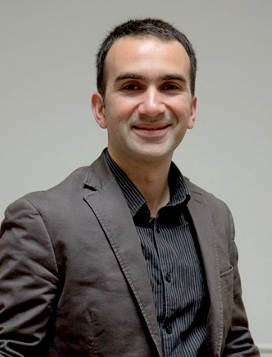Oxford Instruments is pleased to announce that the 2014 winner of the Nicholas Kurti Science Prize is Dr. Alexander Ako Khajetoorians from Institute of Applied Physics, University of Hamburg.
This prestigious award, which celebrates its 10th Anniversary, is sponsored by Oxford Instruments, a leading provider of high technology tools and systems for industry and research.

Dr. Khajetoorians joined the Institute of Applied Physics, University of Hamburg in 2008, following his graduate work in the group of Prof. Chih-Kang Shih at the University of Texas, Austin. He was awarded the prize for the first demonstration of all-spin atomic-scale logic devices as well as the realization of artificial nanomagnets with tailored properties, based on the fundamental knowledge of the atomic-scale spin-dependent interactions.
More recently, Alexander Khajetoorians has begun to explore new materials like topological insulators, as well as address magnetization dynamics at the atomic scale. He has already published several papers concerning the magnetization dynamics of single spins coupled to metallic surfaces.
The work of Alexander Khajetoorians has been published in the most recognized journals in the world, including Science and Nature, as well as Physical Review Letters. His achievements were recognized by the Gerhard Ertl Young Investigator Award at the spring meeting of the German Physical Society (DPG) in 2012, which is an international award for young researchers recognizing significant achievements in the field of surface science. He was also awarded an Emmy Noether Research Group in summer 2013, sponsored by the German Science Foundation (DPG), which he presently leads.
Professor George Pickett of Lancaster University, chairman of the committee of senior scientists who assess the nominations, commented: “The panel have decided to award the prize to Alexander Khajetoorians from a very strong panel of nominees. We were particularly impressed by his pioneering work on the magnetic aspects of nanoscience including spintronics down to the single-atom scale. His work shows much potential for the development of novel devices. The importance of this field has been demonstrated by its high prominence among the work of the prize nominees in recent years.”
The Nicholas Kurti European Science Prize is intended to recognise and promote outstanding achievements of young scientists in the field of physical sciences research and to support their career development. It is named after Professor Nicholas Kurti known for his distinguished work in ultra-low temperature physics at the Clarendon Laboratory, Oxford University. The prize winner receives a €8000 cash prize, a unique trophy and certificate. The winner also has the opportunity to present his work at a conference of his choice.
Previous winners of the prize include Dr Lapo Bogani, Dr Ronald Hanson, Prof. Mathias Kläui, Dr Christian Rüegg, Dr. John Morton, Prof. Lieven Vandersypen, Sir Prof. Kostantin Novoselov, Prof. Dr. Andreas Wallraff and Dr. Silvano De Franceschi.
More information on the prize can be found at: www.oxford-instruments.com/scienceprize
About Oxford Instruments plc
Oxford Instruments designs, supplies and supports high-technology tools and systems with a focus on research and industrial applications. Innovation has been the driving force behind Oxford Instruments' growth and success for over 50 years, and its strategy is to effect the successful commercialisation of these ideas by bringing them to market in a timely and customer-focused fashion.
The first technology business to be spun out from Oxford University, Oxford Instruments is now a global company with over 2300 staff worldwide and is listed on the FTSE250 index of the London Stock Exchange (OXIG). Its objective is to be the leading provider of new generation tools and systems for the research and industrial sectors with a focus on nanotechnology. Its key market sectors include nano-fabrication and nano-materials. The company’s strategy is to
expand the business into the life sciences arena, where nanotechnology and biotechnology intersect.
This involves the combination of core technologies in areas such as low temperature, high magnetic field and ultra high vacuum environments; Nuclear Magnetic Resonance; x-ray, electron, laser and optical based metrology; atomic force microscopy; optical imaging; advanced growth, deposition and etching.
Oxford Instruments aims to pursue responsible development and deeper understanding of our world through science and technology. Its products, expertise, and ideas address global issues such as energy, environment, security and
health.
About Oxford Instruments Omicron NanoScience
Internationally recognised as world leaders in superconductivity, ultra low temperature cryogenic environments and ultra high vacuum environments, Oxford Instruments Omicron NanoScience is driving innovation in these fields. The company’s leading-edge technologies support research in nanotechnology, solid state and condensed matter physics.
Combining outstanding technical expertise, original thinking and a commitment to meeting customers’ needs, Oxford Instruments Omicron NanoScience enables real advances both in research and commercial applications by providing the high quality technological environments needed to meet demanding experimental requirements. Oxford Instruments Omicron NanoScience is part of the Oxford Instruments plc group.